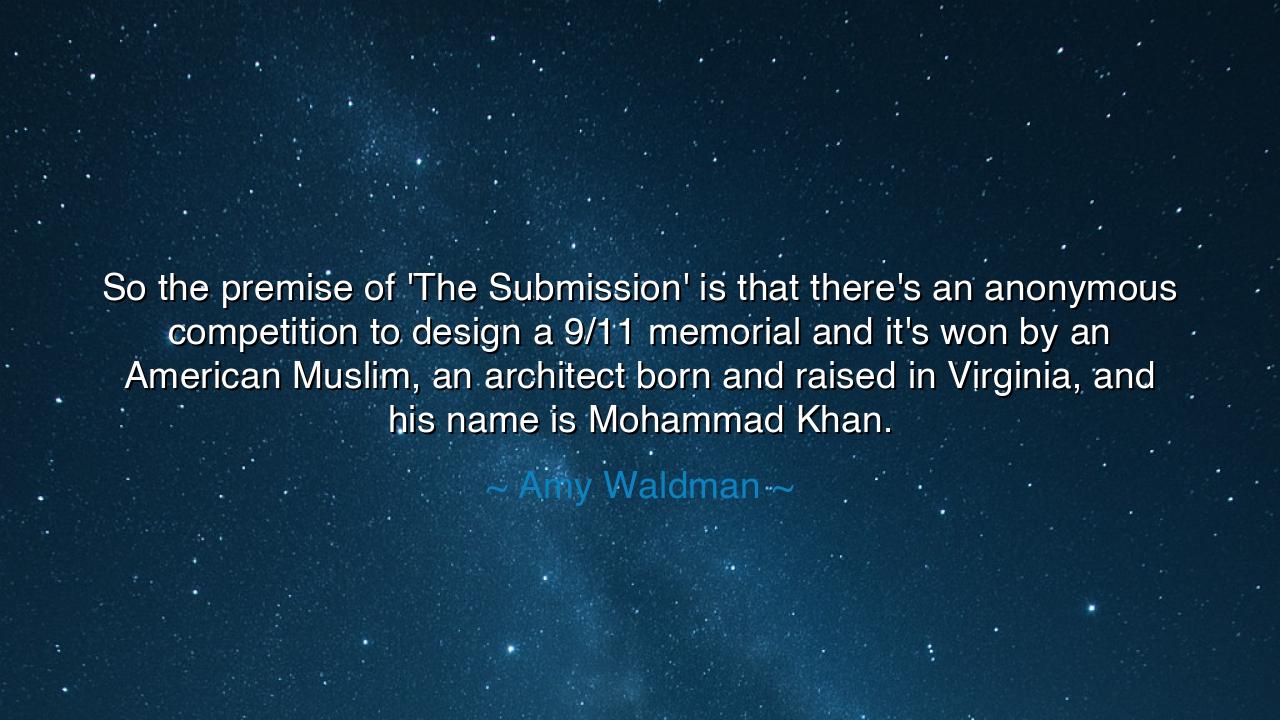
So the premise of 'The Submission' is that there's an anonymous
So the premise of 'The Submission' is that there's an anonymous competition to design a 9/11 memorial and it's won by an American Muslim, an architect born and raised in Virginia, and his name is Mohammad Khan.






“So the premise of ‘The Submission’ is that there’s an anonymous competition to design a 9/11 memorial and it’s won by an American Muslim, an architect born and raised in Virginia, and his name is Mohammad Khan.” — Amy Waldman
Thus spoke Amy Waldman, the writer and seer, whose novel The Submission dared to confront the deepest wounds and questions of a nation still trembling from the ashes of tragedy. Her words describe the premise of her work — but beneath that premise lies a profound exploration of identity, fear, art, and the struggle for understanding in a world divided by suspicion. For in this single idea — that the memorial to one of America’s darkest days might be designed by an American Muslim — Waldman forces us to look upon the mirror of our own souls, and to ask what it means to belong, to forgive, and to see humanity where once we saw only difference.
The origin of this quote rests in the aftermath of September 11, 2001, a moment when the world changed and hearts were carved by grief and rage. In those days, the question of who was “us” and who was “them” grew sharp and unforgiving. The pain of loss twisted into fear, and fear often turned to prejudice. Waldman, once a journalist who covered those very events, saw in the years that followed a nation struggling not only to rebuild its towers, but to rebuild its trust in itself. The Submission was born from this moral unease — from the recognition that art, truth, and faith often collide in the spaces where pain still breathes.
When she tells us that the architect’s name is Mohammad Khan, she names not merely a character, but a symbol — the embodiment of the misunderstood other, the citizen whose loyalty is doubted simply because of his name. Mohammad Khan, born and raised in Virginia, is fully American, yet his identity carries a mark that others cannot see beyond. His victory in an anonymous competition reveals a terrible irony: that when we are blind to identity, we choose purely by merit and beauty, but when the veil is lifted, our fears rise to challenge what our reason has already accepted. This, then, is the heart of Waldman’s wisdom — that prejudice is a betrayal of our higher nature, and that truth often frightens those not ready to confront their own humanity.
The story she tells recalls another moment in history: the tale of Oskar Schindler, the German industrialist who, in the heart of the Holocaust, risked his life to save Jewish men and women. At first, his actions were misunderstood by his peers; to them, compassion for the enemy was weakness. But Schindler’s moral courage shone brighter than their blindness. In much the same way, Mohammad Khan’s art — a design meant to heal and unify — becomes a test for the people who must receive it. Can they see the work for what it is, or will they destroy its beauty in the name of their fear? The parallel is clear: whether in war or peace, our greatest battles are not fought with weapons, but within the boundaries of the human heart.
In The Submission, Waldman’s premise becomes a parable of modern civilization. She reminds us that art is not created to soothe, but to challenge; not to confirm our comfort, but to awaken our conscience. The memorial — symbol of mourning — becomes also a mirror for the soul of a nation. Will it honor only the dead, or will it also teach the living? Will it remember with vengeance, or remember with compassion? The architect, through his work, offers redemption; yet the people, through their judgment, decide whether redemption shall be accepted or refused.
The lesson, then, is this: identity must never eclipse integrity. A man’s birthplace, name, or faith cannot define the purity of his purpose. The value of creation lies in its truth, not in the hands that craft it. Waldman’s tale warns us that when we allow fear to guide us, we betray the very ideals we claim to protect. True security, true peace, comes not from walls of suspicion, but from bridges of understanding. And these bridges can only be built by those who dare to rise above their divisions — the architects of reconciliation, like Mohammad Khan, whose art and courage defy the boundaries of prejudice.
So, my children, remember this: the hope of any nation lies in its willingness to listen to the voices it fears. Do not close your eyes to those who are different from you; do not silence the song of those who love a land that doubts them. For every time humanity chooses fear over faith, it tears down another piece of its own foundation. And every time it chooses empathy over division, it builds anew the temple of peace. Amy Waldman’s words stand as a quiet commandment for all generations — that from the ashes of hatred, only understanding can rebuild the world.






AAdministratorAdministrator
Welcome, honored guests. Please leave a comment, we will respond soon